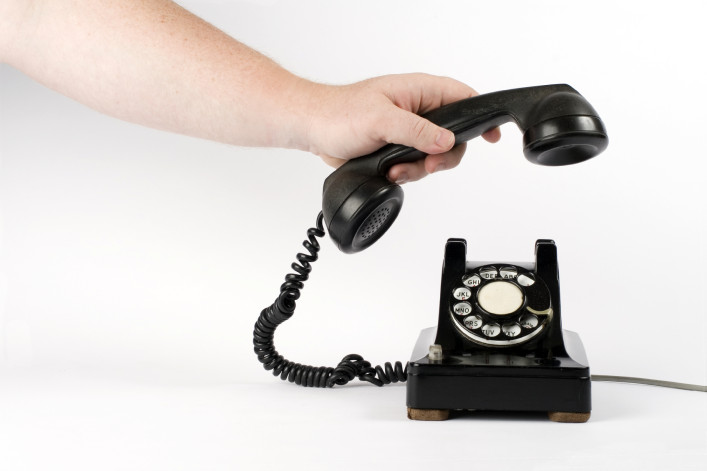But for many New Yorkers, ditching the 212 may feel like tossing a badge of honor into the river. Besides, is it even the smartest choice? As with everything, it depends on a number of factors, such as personal preference, availability, and cost. We break the decision-making factors down for you.
THE UPSIDES TO DITCHING A LANDLINE
Ask any New Yorker one thing they’d like to do, and they’ll probably tell you score a brownstone for less than $1 million (excuse us while we go weep into our $4 bowl of ramen to save money on food). But they might also say they want to cut any costs they can, which makes getting rid of landlines a smart move.
A la carte, a home phone line with Time Warner
goes for $10 a month for the first 12 months, then hops up to $19.99 a month — obviously not the best deal. But if you get a Triple-Play package with TWC — 200 television channels (DVR is $10 extra a month), high-speed Internet, and a landline with voicemail — the phone will cost $89.99 for the first 12 months. By contrast, the next package down offers 20 channels but faster internet (200 Mbps vs. 100). Asking price? $64.99 a month. So if you’re a big television watcher or love your premium sports networks, a bundled package may be the way to go. There are still more costs lurking, though.
There’s the actual phone, which could run anywhere from a few bucks at a stoop sale to more than $140 for a phone-and-answering-machine combo. (Also, for many, a landline means upping the likelihood of wrong numbers and getting heckled by telemarketers, so best to let them go.)
Meanwhile, phone companies like AT&T and Verizon are hoping to phase out traditional copper lines, anyway, as they’re costly to keep and repair. In fact, after Hurricane Sandy, Verizon cut landline service to parts of New Jersey and Fire Island, due to severe storm damage, replacing it instead with fiber-optic FiOS service. In fact, the Federal Communications Commission has said it’s unsustainable for telephone carriers to maintain traditional landlines because of rising costs and declining usage, so even if you decide to keep your landline for the time being, it is probably a technology we will see slowly phased out over the next decade or so.
THE DOWNSIDES
During Hurricane Sandy, millions of New Yorkers were cut off from the outside world after major cell towers from AT&T and Verizon went dark. Many people didn’t have service for at least a week when the city was plunged into darkness, causing extremely long queues at the few derelict payphones around the city. Having a landline doesn’t necessarily mean you can make a call during an emergency (more on that in the “caveats” section below), but it does improve the odds if you have a traditional copper landline.
Also, making landline international calls may be less expensive than cell service, depending on how much you use them. For instance, with Time Warner, you get unlimited calls anywhere in the U.S., Canada, Mexico, China, India and all U.S. territories. With a wireless plan like AT&T’s international plan, you’re paying $5 extra on top of your monthly plan (around $80 a month if you’ve purchased a phone from the carrier), plus anywhere from a few cents extra a minute to more than $3.
And for those who own a home business, having a phone line may create a better separation of work and personal life — you’re only available when you’re in your home office, rather than 24/7, since most of us carry our smartphones like another appendage. Having a landline means also fewer dropped conversations, an important factor when you’re on a big conference call. It also means you’re not subject to the ever-irritating dropped call, poor reception, or static feedback from cell towers, even on this so-called landline.
Plus, and we concede that this isn't a super-practical factor, we think it sounds a bit more professional to have a landline, especially if they have the coveted 212 area code (hey, there's a whole Seinfeld episode devoted to it). And of course, if you can’t find your smartphone or left it in the back of a cab, it’s always nice to have a backup means of communication (or at least a way to call your missing cell phone).
CAVEATS
It’s best to check with your service provider to see if it’s still possible to make emergency calls in a power outage. Older lines have expensive copper wiring different from that used by your TV and Internet, which makes placing calls from a landline possible in a blackout. But in the case of major disasters in New York like 9/11 and Hurricane Sandy, network congestion prevented traditional landline calls from going through. So in reality, it’s always a gamble.
Wireless home phones, like those offered through Verizon FiOS, run on the same channels as wireless fiber-optic networks and pre-existing lines.
According to Popular Mechanics, wireless home phone systems can have the same problems as cell phones, meaning they’re prone to patchy service, blackouts, and outages.
In the end, it’s a toss-up. Sometimes, it can be a cost-cutting measure to rid yourself of the line, whereas other times it’s cheaper to get a bundled package from your service provider, even if you don’t use the landline much.
So by all means, if you want to impress the company with a
vintage-style rotary phone, go ahead. It’s probably more of a conversation piece than a piece you have conversations on.
Related:























